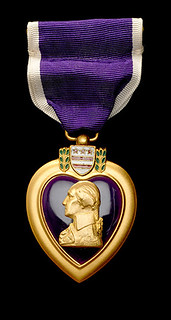
PREV ARTICLE
NEXT ARTICLE
FULL ISSUE
PREV FULL ISSUE
LEGISLATION TARGETS PURPLE HEART MEDAL SALESJim Downey published a letter in the June 11, 2020 MPCGram (Series 21 No. 2422) about legislation pending in the U.S. Congress that would outlaw the sale of Purple Heart medals. With permission, we're republishing it here. -Editor
The driving force behind the legislation is Zac Fike and an organization he founded called Purple Hearts Reunited, Inc. Fike's mother obtained the WWII Purple Heart that was awarded to Pvt. Corrado A. G. Piccolo's family after he was killed in action. Fike tracked down members of Piccolo's family and returned the medal to them. He has since made it his mission to return as many Purple Hearts as he can get his hands on. Along the way, Fike and his supporters have vilified collectors and dealers of military medals as opportunists who seek to make money off other people's valor and death. Dealers in particular are characterized as greedy men who take advantage of old ladies and families by cajoling them out of their family heirlooms for a pittance. Their attitude is understandable but does not represent reality. When it comes to named and traceable awards, collectors seek to honor the recipients. They often spend a great deal of time and money researching the recipients and preserve their stories in publications and websites. The sad truth is that many of these awards have been voluntarily separated from the recipient's family because there is no longer anyone around who has a direct connection to the recipient and the money received has a greater value to them than the medals. (I have personal experience reuniting a WWI Purple Heart to the family of the recipient. It left the family when the grandson of the recipient sold it to an antique store shortly after he came into possession of it after his father died. I bought it from a dealer who had traced the name to a member of the 32nd Division which was made up of Michigan and Wisconsin National Guard. I found an obituary that named a woman I had encountered in business as a grandchild of the recipient. She was more than happy to reimburse me what I paid for it to get it back into the family.) Even so, there is something unseemly about putting a price on this type of material. A KIA award will sell for more than a WIA. But there is inequity even among KIA recipients. The Purple Heart awarded to a Marine who died in the Battle of Iwo Jima will command a greater price than one for a member of the Army who died at Anzio. Will prohibiting the sale of Purple Hearts solve the problem? This assumes there is a problem in the first place. One only needs to look at the unintended consequences of the Stolen Valor Act to see how misguided this approach is. Among other things, the Stolen Valor Act made it illegal to sell Medals of Honor. In addition, it is illegal to manufacture copies of, import, export, mail or otherwise receive anything of value in exchange for a Medal of Honor. Has that halted the sale of the medals? Yes, but only in the United States. Collectors and dealers outside the United States are not affected by the law and Medals of Honor continue to trade in foreign auctions and even on the Ebay sites located in other countries like Ebay Canada. This has led to the absurdity of US collectors being unable to acquire the highest US military valor award while non-US collectors can. The UK does not prohibit trade in the Victoria Cross and it arguably values its military patrimony more than the US does. There are several incongruities in the Private Corrado Piccolo legislation. One is that it only applies to the Purple Heart. It does not apply to any of the valor awards. In other words, it would be illegal to trade in the Purple Heart but not the Distinguished Service Cross, Navy Cross, Silver Star or Bronze Star of a recipient. It also only applies to medals that have been awarded by the government. Copies of US medals are available from non-government sources and the government itself sold off a large stock of WWII era Purple Hearts in the 1980s. How will these be distinguished? And what of the medal that is sold by the original recipient? Unfortunately, like the Stolen Valor Act, the Private Corrado Piccolo legislation has many supporters in Congress. But these are both "feel good" pieces of legislation that take a very heavy-handed approach to a very minor problem, if it is even a problem at all. Similar legislation has been attempted before. Please contact the office of your Senator (about S.122) or Representative (about H.R.2911) and let them know your opinion. -Editor
To read the complete bills, see:
To read an earlier E-Sylum article, see:

Wayne Homren, Editor The Numismatic Bibliomania Society is a non-profit organization promoting numismatic literature. See our web site at coinbooks.org. To submit items for publication in The E-Sylum, write to the Editor at this address: whomren@gmail.com To subscribe go to: https://my.binhost.com/lists/listinfo/esylum All Rights Reserved. NBS Home Page Contact the NBS webmaster 
|
